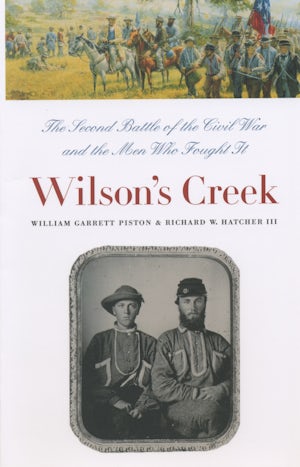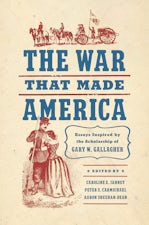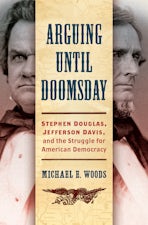Wilson's Creek
The Second Battle of the Civil War and the Men Who Fought It
By William Garrett Piston, Richard W. Hatcher III
432 pp., 6.125 x 9.25, 41 illus., 8 maps, appends., notes, bibl., index
-
Paperback ISBN: 978-0-8078-5575-1
Published: August 2004 -
E-book EPUB ISBN: 978-0-8078-7478-3
Published: May 2002 -
E-book PDF ISBN: 979-8-8908-7222-7
Published: May 2002
Civil War America
Buy this Book
- Paperback $34.00
- E-Book $19.99
Awards & distinctions
2001 Missouri History Book Award, State Historical Society of Missouri
In providing the first in-depth narrative and analysis of this important but largely overlooked battle, William Piston and Richard Hatcher combine a traditional military study of the fighting at Wilson's Creek with an innovative social analysis of the soldiers who participated and the communities that supported them. In particular, they highlight the importance of the soldiers' sense of corporate honor--the desire to uphold the reputation of their hometowns--as a powerful motivator for enlistment, a source of sustenance during the campaign, and a lens through which soldiers evaluated their performance in battle.
About the Authors
William Garrett Piston, professor of history at Southwest Missouri State University, is author of Lee's Tarnished Lieutenant: James Longstreet and His Place in Southern History.
For more information about William Garrett Piston, visit
the
Author
Page.
Richard W. Hatcher III is historian at Fort Sumter National Monument.
For more information about Richard W. Hatcher III, visit
the
Author
Page.
Reviews
"Piston and Hatcher have successfully mined local newspapers and veterans' letters and recollections to show the drama and poignancy of men on both sides marching off to a war whose parameters they could not fully comprehend. . . . [They] have captured well the pathos of the early months of the war as it affected those who fought it."--Journal of Southern History
"In this dense treatment, the authors combine details of battle with a social examination of the soldiers and communities involved."--Blue Ridge Business Journal
"[The authors] unearthed a trove of original-source material to document backgrounds, ideals and motives that brought the two armies to Wilson's Creek. . . . Piston and Hatcher have provided a service to Civil War historians by focusing on a significant battle in the Trans-Mississippi Theater--a region that has received significantly less attention than the East. They are commended for detailing the tactical battle and the soldiers who fought it."--Military Review
"Wilson's Creek will stand as the definitive study of a long-neglected but important battle. . . . It should be seen as a blueprint for the way all Civil War battle books ought to be written. It is military history with a social historian's heart."--Journal of American History
"[The authors] have added to the allure of the Civil War not only by writing a wonderful book that gives the participants a voice, but also by considering the political and military ramifications of the battle of Wilson's Creek in the larger societal context. They deepen our understanding of the relationship between the soldiers and the communities from which they came. . . .With a fresh interpretive framework and rich with insights, this book will take its place among the great battle narratives. . . . An excellent study that deserves a wide recognition for its substantial contribution to Civil War scholarship."--American Historical Review
"[This] detailed tactical study of the battle is as good as any yet produced by the new generation of military historians. . . . [A] fine book."--America’s Civil War




